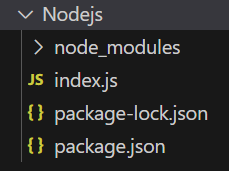Express res.send() Function
Last Updated :
07 Jan, 2025
The res.send function is used to send a response in form of various types of data, such as strings, objects, arrays, or buffers, and automatically sets the appropriate Content-Type header based on the data type.
res.send in Express
The res.send() function sends the HTTP response. The body parameter can be a String or a Buffer object or an object or an Array.
Syntax:
res.send( [body] )
Parameter: This function accepts a single parameter body that describes the body to be sent in the response. e.g., string, array, object etc.
Returns: It returns an Object.
Steps to Install the Express Module
Step 1: You can install this package by using this command.
npm install express
Step 2: After installing the express module, you can check your express version in the command prompt using the command.
npm version express
Project Structure:

Project Structure
The updated dependencies in package.json file will look like:
"dependencies": {
"express": "^4.18.2",
}Example 1: This example responds with a JSON object { title: 'GeeksforGeeks' } when the root URL is accessed using res.sent in Express.
JavaScript
// Filename - index.js
const express = require('express');
const app = express();
const PORT = 3000;
// Without middleware
app.get('/', function (req, res) {
res.send({ title: 'GeeksforGeeks' });
});
app.listen(PORT, function (err) {
if (err) console.log(err);
console.log("Server listening on PORT", PORT);
});
Steps to run the program:
Run the index.js file using the below command:
node index.js
Console Output:
Server listening on PORT 3000
Browser Output: Now open the browser and go to http://localhost:3000/, now check your browser and you will see the following output:
{"title":"GeeksforGeeks"}Example 2: This example demontrates the use of a middleware with res.response to send a json object.
JavaScript
// Filename - index.js
const express = require('express');
const path = require('path');
const app = express();
const PORT = 3000;
// With middleware
app.use('/', function (req, res, next) {
res.send({ "name": "GeeksforGeeks" });
next();
});
app.get('/', function (req, res) {
console.log("Body Sent")
});
app.listen(PORT, function (err) {
if (err) console.log(err);
console.log("Server listening on PORT", PORT);
});
Steps to run the program: Run the index.js file using the below command:
node index.js
Console Output: Now open the browser and go to http://localhost:3000/, now check your console and you will see the following output:
Server listening on PORT 3000
Body Sent
Browser Output: And you will see the following output on your browser screen:
{"name":"GeeksforGeeks"}Summary
The res.send() function in Express.js is an efficient way to send responses to clients. Whether you’re sending text, JSON data, or more complex objects, it takes care of the process for you, making it an essential tool in Express web development.